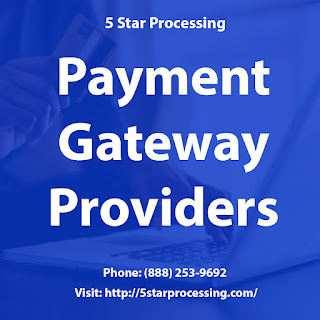Payment Gateway Providers
Payment Gateway Providers | 5 star processing
The best payment gateways serve as the online version of a payment terminal and front-end processor for online and mobile sellers. They frequently sell packaged services that include payment acceptance, information reporting, and fraud management.
Insider Intelligence expects that as worldwide retail e-commerce volume keeps on rising, the revenue the organizations processing these payments can collect as expenses will increase from $82 billion in 2018 to $138 billion in 2024.
Besides, payment organizations, merchant accounts, and customers are moving to digital, which is giving gateways more influence. In the US, e-commerce sales added up to $146.2 billion in Q2 2019, making e-commerce almost 11% of retail overall.
Considering this, it's justifiable that more gateways will need to get a piece of the pie. Yet, as additional organizations pour into this space, it will make hard choices for merchants. Which payment gateway providers would it be advisable for you to utilize? What are the inherent benefits and disadvantages of each?
Underneath, we've ordered a list of the business' leading payment organizations to assist you with choosing. Remember that no one organization or gateway has an overwhelming share of the market, and competition among these organizations remains strong.
1. Worldpay
UK-based Worldpay is one of the longest-tenured online payment platforms. The organization provides several payment services for both online and in-store channels, and in 2018 was considered the No. 1 acquirer by purchase transactions in the US. In 2018 Worldpay was acquired by US rival Vantiv, and the combined entity was subsequently bought by US financial services organization FIS in 2019.
2. Ingenico
Ingenico is a legacy is one of the best Payment Gateway Providers that initially stood out as a top provider by handling in-store card payments - and subsequently is famous among organizations where in-store payments are the main concern. Today, the organization offers payment solutions across in-store, online, and mobile channels.
3. Amazon Payments
Amazon's proprietary credit card payment processor supports payments on its parent's site, which gives it immediate admittance to high payment volume. Besides, it has extended by offering its foundation to other merchant sites - an appealing suggestion for third-party merchants. One disadvantage, however, is that the payment gateway providers assist Amazon with strengthening its brand, which numerous e-commerce merchants should go up against.
4. Braintree
This PayPal-owned gateway supports payments for mobile-driven merchants, and it benefits from its admittance to the large numbers of PayPal sellers. Braintree has secured the business of some of the world's biggest digital merchants. Braintree provides developers with an SDK with numerous features. The firm had an expected 6 billion processed transactions in 2018, and quite a bit of that achievement stems from its strategic focus on mobile, a high-development business channel.
5. Stripe
Stripe has become the world's 6th biggest unicorn at a $35.3 billion valuation. It provides an API that merchants and web developers can use to integrate payment processing into their sites. The organization offers a few free administrations (like discounts) for which PayPal charges transaction expenses. Stripe likewise makes it simple for merchants to update their payment stages utilizing only a couple of lines of code. In any case, merchants should trust that their payments to deposit to an account, and some in higher-risk industries should stand by seven work days.
Conclusion
Also, with that, we have given you the best Payment Gateway Providers. Nonetheless, if you're searching for a custom payment gateway script or cash transfer clone script, you ought to contact any of the main payment gateway providers. They have expertise in creating custom payment gateways, including payment processor clones.

Comments
Post a Comment